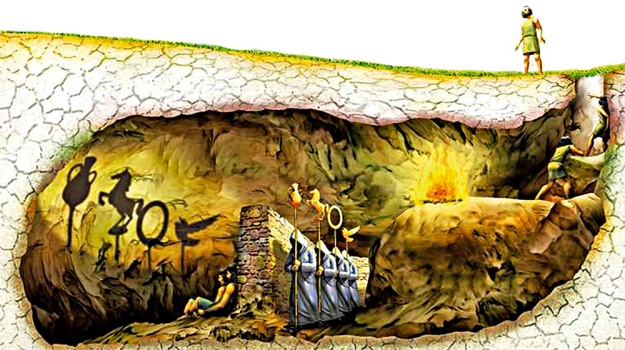
If we make the decision to believe that a Jewish man whose name was Yeshua (or Yehoshua) really lived in the time of the onset of the Common Era (otherwise known as Anno Domini), we are obligated to view such a person as he would have looked in that time and place.
Furthermore, the idea that such an individual was God – and knew without a doubt that He was God – bears no weight in a reality to which mortal men and women can both relate and lose themselves in following a model of human existence. The model must include a sense of who and what we are, where we came from and what purpose lays before us when we are born.
A historical Yeshua as a human role model cannot enjoy the privilege of being the “Boss’s Son” with divine attributes and powers at his disposal as a divine inheritance with which no other human is born.
As soon as the insistence that Yeshua was “different” from the rest of humanity is accepted, our understanding of the Christian Mythology becomes terribly skewed. We cannot understand and accept a similar pattern toward which we can aspire because we were not born with the same divine attributes and powers available to Yeshua as “tools” by which we might evolve.
We are left with believing in an inadequate Christian theology that never had one thing to do with human reality. It had everything to do with the imagination of Roman Catholic fathers who concocted all the stories that make up a catechism or orthodoxy of beliefs which were in fact Church tools to maintain authority and dominance. The lie of such orthodoxy is that the world is portrayed as an unfair and unequal environment into which we are all born and into which we will fail and die if we do not rely on mortal authoritative middle men whose authority is only a pretense.
If we accept the “unfair and unequal” concept, we are led down the path of unquestioning acceptance of silly notions like “original sin”, “the fall of man”, our desperate need for redemption and a redeemer, forgiveness of sins that offend a righteously judgmental god, and which set up every performance-based religion we might imagine.

Our human history is a long horrifying story of simple-minded and childish belief. It is unquestioning submission to theological imaginings and a literal-minded presentation of a very limited and uncritically considered “reality” or “automatic stance.”
It has always been a way of living by someone else’s magic.
The basis for any notion of other human beings as “less than” or “cursed” or “not as worthy” is informed by the same simple-minded and childish beliefs which are then acted out in an assortment of cruelties that are never and have never been justifiable.
I truly do not care if Yeshua or Jesus was a real person. Rather, I want to record here a marvelous quote from the book “Myth and Ritual in Christianity”
“Our main object will be to describe one of the most incomparably beautiful myths that has ever flowered from the mind of man, or from the unconscious processes which shape it and which are in some sense more than man.… This is, furthermore, to be a description and not a history of Christian Mythology.…
After description, we shall attempt an interpretation of the myth along the general lines of the philosophia perennis, in order to bring out the truly catholic or universal character of the symbols, and to share the delight of discovering a fountain of wisdom in a realm where so many have long ceased to expect anything but a desert of platitudes.”
—from the Prologue, Alan Watts
What is that myth? Simply put, it is the mythical proposition that we come from the divine, are born divine, start out life totally innocent and untarnished by any original sins, imperfections, and handicapped by moral flaws. We are born free to make our way forward despite challenges or disadvantages that have nothing to do with any theological pre-existence.
The myth portrays an immortal spirit who leaves the presence of the Great Divine, and becomes a helpless and vulnerable human child, perhaps born of poor and humble parents in extremely humble circumstances. That is in fact who each of us are whether a manger is our first experience or a silver spoon.

Our lives are our own from the get-go. If parents were wise, they would endeavor to teach their children the virtues as ways of being and certainly not commandments of a law-giving god who tolerates no sin with any degree of allowance.
I agree with Ricky Gervais who recently made a suggestion that parents refrain from teaching any religion to their children in black and white either/or terms until they have taught their children critical thinking and given them, say, 15 good years of learning to discern, discriminate and acquire habits of judgment that do not rely on someone else’s magic as superior to their own magic.
What engenders emotional pain and pleasure with the arrival of each Christmas season is a longing learned earlier in life’s experience, a sense of the almost miraculous feelings that seem to permeate society despite the increasingly desperate marketing attempts to make money off the season and a nostalgia for the times of our own innocence when we assumed a more universal goodness – perhaps where goodness didn’t universally exist – and bought into the feelings.
Whether Yeshua actually existed and said these things is not as important as that these things, these concepts have existed for thousands of years in one philosophical or religious form or another. They represent a spontaneous way of living that need not scripture nor preaching to come to our attention. They represent of spontaneous way of seeing the world that counters – even represses the urge to superiority and exclusivity that have been so destructive to the condition of being human.

